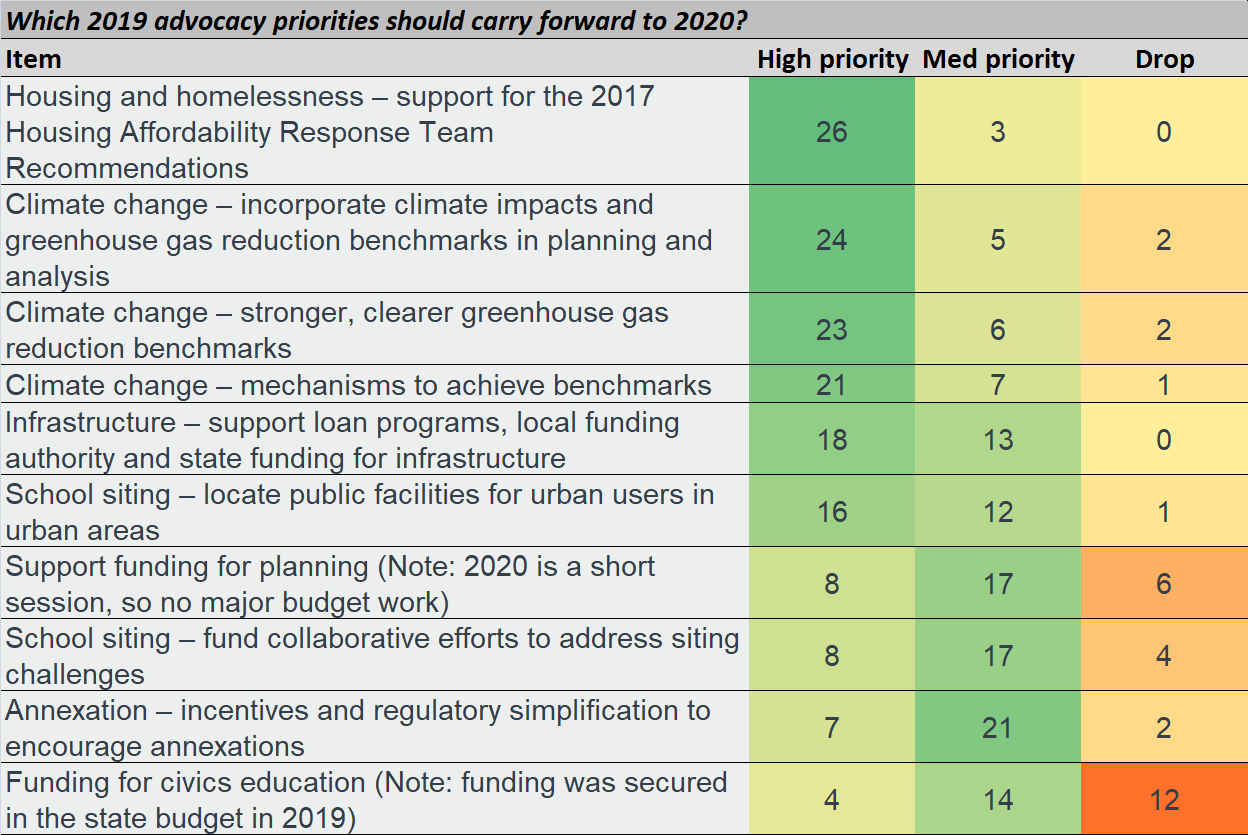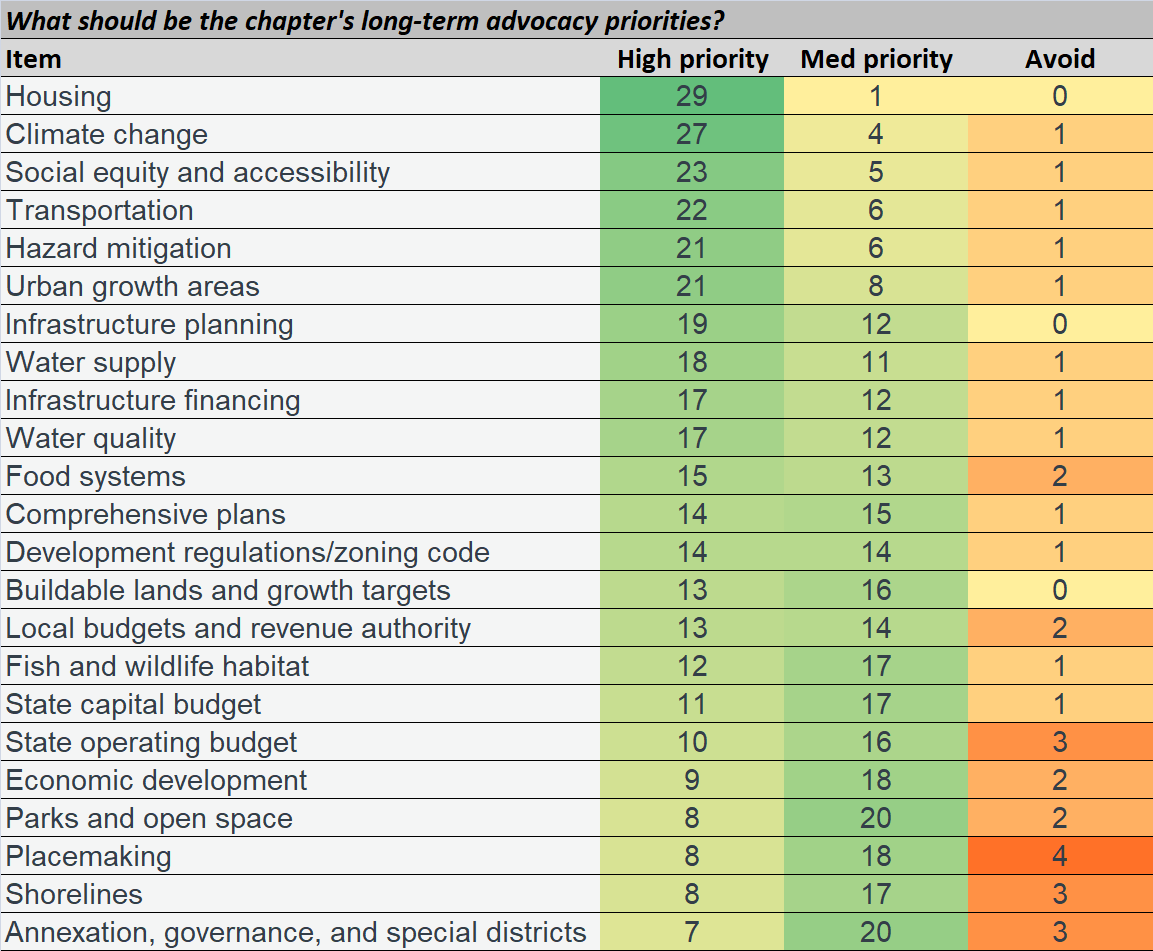- About Us
- Events & Training
- Professional Development
- Sponsorship
- Get Involved
- Resources
Legislative Committee Update and Preparations for 2020 SessionEsther Larsen and Yorik Stevens-Wajda, Legislative Committee Co-Chairs Now that our Thanksgiving feasts, and attendant family conversations about the planning issues of the day, are receding into memory, the legislative committee is ramping up our work to prepare for the coming legislative session. While our focus is definitely on the January 13 opening gavel of the 2020 session, the committee does do some work just about every month of the year. See below for a recap of recent activities by the legislative committee and a preview of the 2020 session from chapter lobbyist Mike Shaw. 2019 APA-WA State ConferenceLegislative committee members participated in or helped develop two sessions at this year’s October 16–17 conference, which we found as a whole to be thoroughly interesting, inspiring, and educational. The committee hosted a session (the first hosted by the committee in recent memory) titled The Latest in APA Legislative Advocacy and Update on Recent Laws Impacting Planning in Washington State. This session featured: an overview of national APA’s advocacy program and some of the issues that have been seen around the nation (housing has been a big one throughout the country) from APA State Government Affairs Associate Catherine Hinshaw; a preview of the 2020 state legislative session from chapter lobbyist Michael Shaw; and a review of bills that passed the 2019 legislature from Legislative Committee Co-Chairs Yorik Stevens-Wajda and Esther Larsen. Yorik also participated in a session developed by Joe Tovar focusing on the Road Map to Washington’s Future project and report. Given the forward-looking theme of the Road Map project, and its focus on highlighting areas of improvement to the state’s legal planning framework, a collaboration with the legislative committee seemed natural. A highlight of the session was the opportunity for APA to compare notes with panelists Dave Andersen from the Department of Commerce and Carl Schroeder from the Association of Washington Cities. The legislative committee also set up a “Meet and Greet” table in the Exhibitor Areas and answered questions, provided attendees with materials, like the draft 2020 APA-WA legislative priorities document, APA Policy Guides, and welcomed interested members to sign up to the committee. During the awards luncheon at the conference Yorik was honored as the recipient of the Robert “Bob” Burke award for volunteer service to the chapter as a member and co-chair of the legislative committee. 2020 Legislative PrioritiesAPA Washington’s 2020 Legislative Priorities document were presented for board approval on December 19 (a draft was reviewed by the chapter’s board of directors at its October 15 meeting). This document sets forth the chapter’s priorities for action at the state legislature to support good planning and make great communities happen. Once approved, the document will be made available on the chapter website, distributed to legislators and their staff, the governor and his staff, as well as peer organizations and other stakeholders. The committee also uses the document to as a touchstone against which to review legislative proposals during the session and express support or opposition, or suggest amendments, on behalf of the chapter. A big thanks to all who participated in the development of the chapter’s 2020 legislative priorities, including those who filled out the comment form over the summer. The comment form is the primary tool that the legislative committee uses to gather input from chapter membership on what we should be advocating for on behalf of the chapter. Comments were received between August and October, and generated interesting results and some very insightful individual comments. Chapter members identified housing as the highest priority topic for chapter advocacy efforts, which dovetails well with national APA’s current focus on housing. Climate change was a close second, and those top line results are consistent with what we heard from last year’s comments. The legislative committee has taken note of these results, as well as dozens of individual comments received, and will focus our efforts accordingly in 2020. Summer 2019 Comment Form Responses
Preview of the 2020 Legislative Session by Michael Shaw, chapter lobbyistThe 2020 legislative session is a 60-day session, starting January 13 and ending on March 12. Prefiled bills are starting to pile up, but most of the legislative attention is on the impact of Initiative 976, which reduces fees and taxes relating to vehicle licenses. The Passage of I-976 will result in a $1.9 billion loss of revenue over the next six years; including a $478,093,000 hit in the 2019–21 biennium. Besides the I-976 transportation impacts, the Legislature is expected to continue addressing the homelessness crisis (considering local funding options and density infill bills), and the ongoing mental health/substance abuse integration process. Also, the Legislature is expected to address special purpose districts, and the budget and policy implications of Governor Inslee’s vaping ban. There is talk of a bill that would move the comprehensive plan updates under the Growth Management Act from every eight years to ten years. 60-day sessions are generally unremarkable — consisting of minor policy bills and preparation for the next general election — and have shortened bill deadlines. According to the draft 2020 session calendar, the first bill deadline is February 7, and the time to consider bills from the other chamber, i.e., Senate bills heard in the House and House bills heard in the Senate, is very short: nine-days for policy committees and 12-days for fiscal committees. However, this session is unique — it is the first session in about 20 years where Frank Chopp is not the Speaker of the House. Speaker-designate Laurie Jinkins is likely to be much more deferential to the House Committee Chairs and many of the unwritten agreements between the minority party and the majority party may no longer be in force. All bills that were introduced in 2019, but failed to pass the Legislature, are technically still alive during the 2020 session. Last year’s House bill (HB 1100) regarding a clean fuels program with penalties and credits failed in the Senate, but it could resurrect. However, with the 2020 election on the horizon some legislators may wish to delay action on such matters, and since legislators cannot raise money during the session, they are motivated to get done on time – leaving a small window to tackle large policy matters. Next stepsThe legislative committee is working on several items with an eye on the 2020 session, including finalizing the legislative priorities document mentioned above, reviewing pre-filed bills, coordinating with the chapter lobbyist to prepare a 2020 session bill tracking list, looking into planning a day of advocacy in Olympia, and continuing recruitment of volunteers to the legislative committee. Return to the November/December issue of the Washington Planner |



